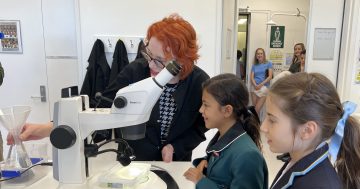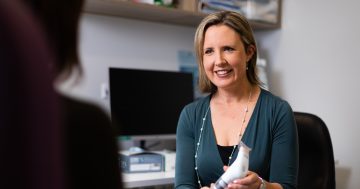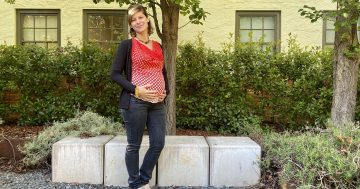
Associate Professor Aude Fahrer says an ongoing Phase 1 clinical trial at The Canberra Hospital has shown positive results. Photo: Jude Kidston/ANU.
Researchers at the ANU are hopeful a low-cost, non-toxic therapy can revolutionise cancer treatment, making chemotherapy a thing of the past.
The treatment injects dead bacteria into cancer to fool the immune response into trying to kill not only the bacteria but also the cancer.
While it’s in its early days, lead researcher Associate Professor Aude Fahrer says an ongoing Phase 1 clinical trial at The Canberra Hospital has shown positive results and she hopes it could improve outcomes for patients living with cancer.
Eight patients have already been treated as part of the trial and, because it’s a Phase 1 trial, all of them have been late-stage patients with advanced cancers.
“We were able to significantly improve the patient’s quality of life by reducing the amount of liquid around their lungs and was able to shrink one of their cancers,” Associate Professor Fahrer said.
Unlike more common treatments like chemotherapy and radiology, this treatment requires few dosages, is simple to administer, and has fewer side effects.
“It is also extremely low cost. We are looking at around $20 a dose, whereas the cost of other immunotherapies can run to $40,000. This makes the treatment accessible for patients in developing countries,” Associate Professor Fahrer explained.
The bacterial-based immunotherapy which makes up this treatment is simple, if a little unconventional, and literally involves injecting a slow-release solution of dead mycobacteria directly into the cancer.
According to Associate Professor Fahrer, the idea is that the immune cells then attack the bacteria, even though they’re dead, and as a side effect cause the immune cells to attack the cancer as well.
“Once the immune cells multiply they can travel around the body – so it would not only attack the cancer at the injection site, but any metastases – where the cancer has spread to another part of the body,” she said.
Associate Professor Fahrer says it has been a lengthy process to get to this point with generous support from the Canberra community enabling the research and the trial to go ahead.
She first came up with the idea more than 14 years ago when on maternity leave with her second child.
Since 2012, various animal trials have been conducted before the most recent clinical trial going ahead and a second clinical trial at The Canberra Hospital has already been approved.
Part of the funding came through the Lea Chapuis Memorial Fund.
Lea was a family friend of Associate Professor Fahrer who knew about this project and wanted to be part of the trials, but sadly became too sick to participate and passed away before she could do so.
“Lea asked people to contribute to the research in lieu of flowers when she passed away.”
You can donate to the Lea Chapuis Memorial Fund to continue to fund research and development of the new treatment.





















